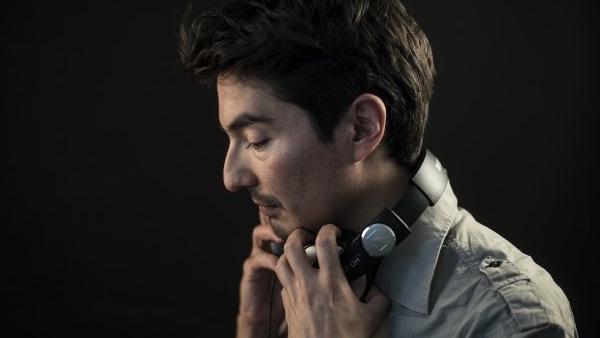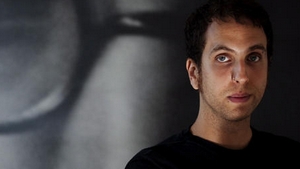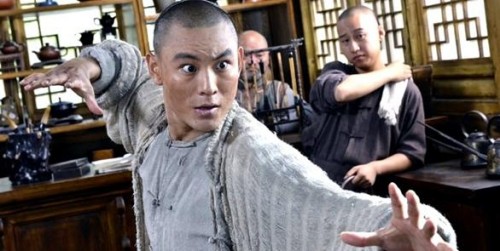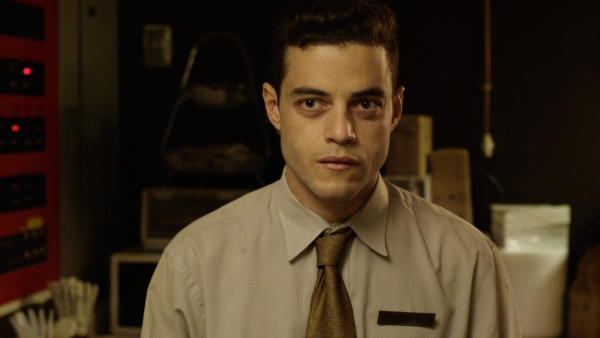 Writer/Director Nikolas List studied film directing at the IAD in Belgium. Ange, his final university project, was selected by more than 50 international film festivals and awarded many prizes. List’s follow-up effort, Tombville, is also his full-length film debut and is a story that will stick with you long after you’ve seen it.
Writer/Director Nikolas List studied film directing at the IAD in Belgium. Ange, his final university project, was selected by more than 50 international film festivals and awarded many prizes. List’s follow-up effort, Tombville, is also his full-length film debut and is a story that will stick with you long after you’ve seen it.
Tombville follows 25 year old David, a man who wakes up in a village plunged into darkness with no memory of what happened or how he ended up there. He quickly realizes that it is impossible for him to escape: whatever direction he takes, he always finds himself back at the same point. Memories of his past come back to him bit by bit, like the pieces of a puzzle. David then begins to realize what he has to do in order to escape from his suffering. This dark story screened at Fantastic Fest this year and we thought it was one of the best entries in the festival (check out our capsule review of it here).
It all plays like a living nightmare, and the story is more than just a little unnerving. But, with such vision and style on display in this very focused narrative, he’s definitely a director to watch. Enjoy our time with Nikolas.
GoSeeTalk: There are a lot of demons David faces. Ultimately, the hardest thing we have to face is ourself and, further, the truth. I know it ‘s a trite question to ask, but where and how did you come up with the idea for Tombville?
Nikolas List: It all started with the name itself ”Tombville” – I liked that name. I usually start projects with a spark like that and then what I call a “”list of ingredients”. I was thinking of making a dark western with gloomy characters. One thing led to another and it moved away from the western thing into something else (also partly due to the production conditions). I also wanted to make a modern version of German expressionist films, like Carl Dreyer’s “Vampyr”, those are some of the films I love.
This is your first feature film, and I have to say your debut effort is astounding. From where I sat in the Drafthouse during Fantatic Fest, it certainly looks like you achieved what you set out to do. What was it like making your first film? This also looks effortless, so did things develop easier or more difficult than you envisioned?
It was the most difficult thing I’ve done so far in my life. I graduated from film school in 2007 and only got to the end of this first feature 7 years later, those were 7 very painful years. I tried to go about it the traditional way with a producer, funds, etc. But after several failed attempts and lots of discouragement, the only thing left to do was to make it on my own, with whatever I had on my bank account – which wasn’t much. I had read about Shane Carruth, making his films in the way he does, and that gave me hope. So that’s how the film was made: no budget, some very talented actor friends, a very young crew, and a laptop for post production.
You do so much with close-quarter shots and dark, minimally lit sequences. It’s also made incredibly interesting because it’s a non-linear story. So, what drove those creative decisions?
When you attend film school, they teach you the traditional way of writing a script. But for me, those traditional rules don’t help
the creative process, they hinder it. So I had to take on the writing process in my own way, and non-linear was much more freeing to me than the linear approach. Plus, the film is a puzzle, so to me it made perfect sense to go about it with that approach. I also think that the audience nowadays is ready for more “avant garde” story telling, and there’s a whole lot more to explore in non-linear approaches. About shooting in the dark, I thought it would be more interesting and claustrophobic to have a character evolving in pitch black, and create his environment with sound instead of image, letting the audience imagine this world. It’s much more creative and challenging.
This has very abstract and deluded references to, among other things, Alice In Wonderland. Was that intentional? And if so, why that story?
I studied illustration in high school and I started by drawing the characters before writing the script. I think that fact influences the tone of the film, giving it a “Fellini” or “Alice in Wonderland” feel. Having that background in illustration and art, I guess that also influences everything in my filmmaking process: how I design characters and shots, among other things.
A number of films showing at Fantastic Fest are just over the 60 minute mark. What was your criteria for keeping this to such a concise length?
There are several reasons for this. I wanted the film to be very intense from beginning to the end, so I kept cutting the film until I
felt I had removed everything that could be deleted. Also, I felt that this was the proper time to tell this story. I also feel that the audience nowadays is used to the series format, an episode being 50 minutes – that also influences how people watch films today. And from a production perspective, considering I did everything – write, direct, produce, edit, score – that format was what I could take on, with the equipment I had, and the processor on my laptop;-)
Aside from being a very dark and exhausting story, it’s made infinitely heavier due to the jarring familial element between David and his Mother. It’s not easy to take. Even though certain elements are implied, it says something about how different countries view certain subject matter – namely the mother/son element. All that said, what do you as a foreign filmmaker see when taking this from country to country ? Do different countries and cultures react differently?
I was born in the US but grew up in Europe. So I’ve been raised in both cultures and what I can say, as a general statement, is this: in American films, you can have as much violence as you want, but no sexuality. In European films (mainly French), you can have nudity and all the sexuality you want, but violence is not accepted. These are general statements and of course you can find lots of exceptions, but that’s how it seems to me. Personally, I find that the hypocrisy around the subject of sexuality is huge. And why would certain forms of sexual violence be more acceptable than others? Why would rape be more acceptable than incest?
How did the Fantastic Fest crowd react?
The way I intended: half loved it, half hated it. I don’t search for middle ground, I certainly don’t think an artist should be trying to “please” anyone – artists are not politicians. The only thing you can do is follow your heart, be faithful to the project, and be honest. This is a radical film, so it is meant to have radical reactions – that’s what makes art powerful.
What other film festivals are screening the film? Also, has it been picked up for distribution?
It started its tour in the prestigious Gerardmer festival in France in January and has been all over the world since then, next will be
Morbido in Mexico. I am exchanging with distributors for the moment. But to be honest, this film is so unconventional and radical, I never expected to have it fit into a distributor’s shelf and labeled as just another horror film. Also, the distribution model is so open in 2014 – is there really any one rule for distributing a film today?
I guess not. Well Nikolas, I can’t wait to see what you come up with next. Until then, what did you learn about this industry that was the most meaningful or impacting? Similarly what are your ” lessons learned ” that you’ll take with you to the next film? Also, on that note, what are you working on now?
Always follow your intuition, stay true to the project, to yourself. Amazing films are made with a good story, good actors, a camera and a laptop for editing – nowadays, that’s all it takes. Make the best with the elements at your disposition. Those are my mantras. I’m currently working on a new feature – a film noir – and a series, along with my other fields of work: music and painting.
Thanks to Nikolas for his time. Check out the trailer for Tombville below.


